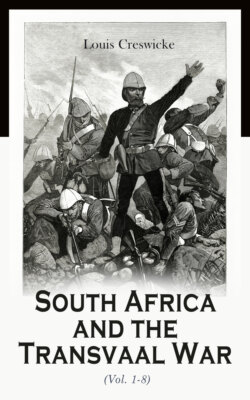Читать книгу South Africa and the Transvaal War (Vol. 1-8) - Louis Creswicke - Страница 66
На сайте Литреса книга снята с продажи.
SIR W. PENN SYMONS—GLENCOE
ОглавлениеTable of Contents
By the death of Major-General Sir William Penn Symons, the British army lost a brilliant and distinguished soldier, and a man of great valour and courage. He came of a Cornish family, the founder of which was a Norman knight who came over with William the Conqueror. The eldest son of the late William Symons, Recorder of Saltash, he was born in 1843, and in 1863 joined the South Wales Borderers—the old 24th Regiment. He became lieutenant in 1866, captain in 1878, major in 1881, lieutenant-colonel in 1886, and colonel in 1887.
His first experience of active service was in 1877, when the Borderers took the field against the Galekas. In the Zulu War of 1879 he served with distinction, but was not present at the battle of Isandlwana, being away from his regiment on special duty. In 1885 he served as Deputy-Assistant-Adjutant and Quarter-Master-General, organising and commanding the Mounted Infantry in the Burmese Expedition. Being honourably mentioned in dispatches for his services with the Chin Field Force, he received a brevet-colonelcy. In 1889–90 he was given a brigade in the Chin-Lusha Expedition, was again mentioned in despatches, made a C.B., and received the thanks of the Government of India. He commanded a brigade of the Waziristan Field Force in 1894–95 with like distinction, but he will best be remembered in connection with the campaign on the North-West Frontier of India in 1897–98, after which he was made a K.C.B. In 1898 he gave up his appointment in India and took command of the British troops in Natal.
He was one of the best shots in the army, his military hobby in fact being musketry, though he was also a great authority on the subject of mounted infantry. He was a keen sportsman, an excellent linguist. He was highly respected by all who knew him. As an evidence of how he was regarded by his brother officers, one may quote from the telegram which was sent from Sir G. White to the War Office on the morrow of the battle of Glencoe. The communication said: "The important success is due to his great courage, fine generalship, and gallant example, and the confidence he gave to the troops under him."
Mr. Winston Spencer Churchill's remarks about him, in a letter to the Morning Post, show how fully he was appreciated for his social as well as for his military qualities.
"So Sir Penn Symons is killed! Well, no one would have laid down his life more gladly in such a cause. Twenty years ago the merest chance saved him from the massacre at Isandhlwana, and Death promoted him in an afternoon from subaltern to senior captain. Thenceforward his rise was rapid. He commanded the First Division of the Tirah Expeditionary Force among the mountains with prudent skill. His brigades had no misfortunes; his rearguards came safely into camp. In the spring of 1898, when the army lay around Fort Jumrood, looking forward to a fresh campaign, I used often to meet him. Every one talked of Symons, of his energy, of his jokes, of his enthusiasm. It was Symons who had built a racecourse on the stony plain; who had organised the Jumrood Spring Meeting; who won the principal event himself, to the delight of the private soldiers, with whom he was intensely popular; who, moreover, was to be first and foremost if the war with the tribes broke out again; and who was entrusted with much of the negotiations with their jirgas. Dinner with Symons in the mud tower of Jumrood Fort was an experience. The memory of many tales of sport and war remains. At the end the General would drink the old Peninsular toasts: 'Our Men,' 'Our Women,' 'Our Religions,' 'Our Swords,' 'Ourselves,' 'Sweethearts and Wives,' and 'Absent Friends'—one for every night in the week. The night I dined it was 'Our Men.' May the State in her necessities find others like him!"
